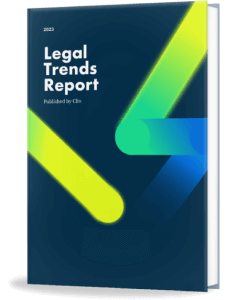In today’s hyper-connected world, clients expect law firms to have all the right measures in place to protect their sensitive information.
Along with strong security protocols, cybersecurity insurance for law firms is a powerful component of a risk management strategy. In particular, it provides financial coverage that can help solo practitioners and small law firms recover from costly data breaches, ransomware, and other types of nefarious attacks.
Unsure where to get started? Read on to learn how to get the right coverage for your firm.
Any business that stores data online can use the protection that’s offered through cybersecurity insurance. But cyber criminals target law firms in particular because they deal with highly sensitive and confidential information from multiple entities. As a law firm, that means a single attack could result in hefty fines, eroded trust and reputational harm.
Do law firms need cybersecurity insurance?
Even with highly-secure technology, your firm is vulnerable to human error.
It could be a mistakenly-opened phishing email that’s compromised your firm’s data. A lost or stolen laptop while traveling for work. Or a visit to a fraudulent website that’s installed malicious software on a device.
In the event that your firm falls victim to an attack, you’ll be grateful to have insurance to manage the damage.
What does cybersecurity insurance cover?
Generally speaking, there are two types of cybersecurity insurance coverage for law firms.
First-party cyber liability insurance supports law firms with the direct financial impact of a breach or cyber attack in their network or system. Your coverage may include:
- Fees associated with restoring data loss due to downtime,
- Crisis management,
- Forensic investigations,
- And more.
On the other hand, third-party cyber liability insurance protects law firms from liability claims made against them in the event of a breach. Coverage can span from payments to affected clients to regulatory fines for noncompliance and more.
Law firms can opt to have first-party coverage, third-party coverage, or a combination of both. The protection you need will ultimately depend on the specific needs of your firm.
How cybersecurity insurance protects law firms
Cybersecurity insurance can help minimize the financial impact of cyber attacks. It covers the direct cost of data breaches and cyber attacks, as well as lawsuits that may arise from one. In exchange, law firms pay a monthly or quarterly fee to an insurance provider.
Typically, cybersecurity insurance won’t provide coverage for property damage and loss of intellectual property.
Does legal professional liability insurance cover cyber attacks?
Your legal professional liability (LPL) insurance may include limited coverage around cyber attacks, but not enough to dismiss cybersecurity insurance.
For one, LPLs are designed to protect you against malpractice suits. If you experience a cyber attack, your LPL will not help you recover the financial losses from the attack itself.
In addition, cybersecurity insurance usually offers more comprehensive coverage for third-party losses than your LPL.
Be sure to check out our cybersecurity for lawyers hub for more resources.
How to get cybersecurity insurance for your law firm
It may feel daunting to explore all of the options for cybersecurity insurance. But it doesn’t have to be. Here’s what you need to know to protect your law firm.
Determine what you need coverage for
Start by conducting a comprehensive audit of the cybersecurity threat landscape within your law firm.
This step will help you understand your current risk, along with specific areas that you need to protect. You’ll want to be clear on your most critical data, so you’re investing the most resources in safeguarding your “crown jewels.”.
There’s no set formula for determining the coverage you need, but understanding your security risk will also help you understand what protections you need. Spend time reviewing your audit, assessing your budget, and choosing coverage that best suits the needs of your firm. For instance, a larger firm that handles lots of highly confidential information (like medical records) will want to invest in extra protection.
Shop around for the right policy
Nowadays, there’s a plethora of pricing and coverage options available for cybersecurity insurance for law firms. Do your due diligence and seek quotes from multiple providers.
When reviewing policies:
- Thoroughly read the terms and conditions of each policy.
- Ask providers thoughtful questions.
- Gain clarity when you need it.
- Understand what type of incidents are covered—and which aren’t.
For example, it’s helpful to know whether there are geographic restrictions, especially if your team is frequently on the road.
Consider leveraging Clio’s online directory of experienced law firm consultants to cut down on time. Finding an experienced insurance provider who understands the unique needs of this industry can provide optimal coverage and peace of mind.
Talk to other attorneys
As you seek to find the best cybersecurity insurance policy for your law firm, other lawyers can be an invaluable resource. Speak to your peers to learn about their own experiences and learnings in choosing a cybersecurity provider.
Looking to expand your network? At Clio, we have a range of articles that shine a light on the power of mentorship and networking in the legal industry. We recommend perusing this guide on legal mentors, along with our round-up of attorney networking tips.
Work with an insurer that specializes in cybersecurity insurance for law firms
Given the highly-sensitive nature of legal work, it makes sense to use an insurance provider specializing in the legal industry.
Working with an insurance firm with experience in helping lawyers will ultimately ensure you have a partner who truly understands your unique needs and risks. Unsure where to get started? Check out this list of Clio Certified IT Consultants.
Take precautions to protect your data
Finally, be sure to take steps to protect your data and information. The American Bar Association’s 2022 Legal Technology Survey Report found that 27% of respondents had experienced a security breach at some point. Clearly, law firms can do much more to prevent these costly attacks.
To start, take stock of the data security measures at your firm. This includes everything from spam filters to firewalls and anti-virus software.
Educate your staff on how they can intercept risks, too. Offer ongoing training that emphasizes how to create secure passwords, spot malicious emails, safely browse the web, and more.
Get an in-depth look at how to protect your legal data and further improve your cybersecurity measures within your law firm.
Work with trusted legal practice management software providers
It’s important to choose software providers you trust, like Clio Manage. Each year, our platform is tested by a leading cybersecurity firm to ensure it’s secure.
Clio is also audited and certified every day by McAfee Secure to verify that our products aren’t affected by malware, vulnerabilities, and other online threats. Learn more about how the cloud is safer than on-premise servers.
A final word on cybersecurity insurance for law firms
For all the efficiencies that technology delivers, it also brings an increased risk of cyber threats. Sometimes, the damage can be irreparable. In fact, one study found that 60% of small businesses close after a cyber attack.
Although law firms can never be entirely secure, you can take steps to dramatically reduce your risk. Cybersecurity mitigates the financial costs to a law firm when attacks strike—helping lawyers get back to doing the work that truly matters.
However, it’s also important to take steps to prevent a cyber attack from happening. Read our 2023 Law Firm Data Security Guide for up-to-date security tips.
Frequently Asked Questions
Is cybersecurity insurance worth it?
Legal firms that store business or customer data online should protect themselves with cybersecurity insurance. Cyber criminals specifically target law firms for their highly-sensitive and confidential information. Cybersecurity insurance can cover the direct financial cost of a security breach, as well as third-party costs from associated lawsuits.


